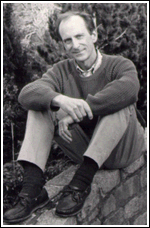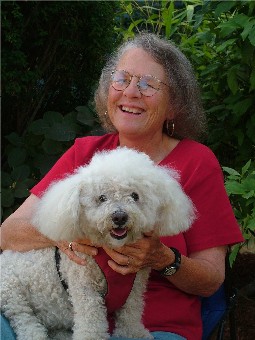
Two of the environmental movement's true icons appeared on the same stage together at the Sleeping Lady conference. It was quite a momentous occasion. I introduced Harriett Bullitt as the Godmother of Northwest environmentalism, someone whose good works and philanthropy have shaped our region indelibly and in ways that will be even more fully appreciated as the future unfolds.
Here's Paul's notes from their appearance:
Harriet Bullitt
We're delighted you're using Sleeping Lady as we hoped you would. It's really designed for just this type of conference.
It's the most intimidating challenge to me to be asked to introduce Denis Hayes, whom I've known for a very long time. It's impossible to describe or chronicle what this man has accomplished, in an incredible life that isn't all that long. He isn't old enough to have done all the things he has done, if I could boil it down to a thumbnail sketch, this is a life with a mission that was never abandoned, starting with Stanford in the '60s and travel the world around soul-searching, then law school and abandoning the law for a mission that would become his life's pursuit. His first Earth Day created with Gaylord Nelson the idea of setting aside a day a year to protect and preserve the earth. There are now 170 countries that celebrate Earth Day, and China celebrated Earth Day at turn of century, I was there and saw it happen. Believe me, the Chinese are doing some things better than we are. Their fuel emissions and recycling are better than what we do. They have political power and the influence has been very profound. That and Denis' solar agency for Jimmy Carter, but probably the most important thing is he came to the Bullitt Foundation now 13 years ago, they've been short years but during that time he has led our foundation to heights it never dreamed of seeeing, small groups and big groups focused in NW but with ripple effect throughout the country. Denis threw the stone in the lake that has rippled so widely.
Denis Hayes
I can't say what a thrill it is to be introduced, for such along time it hasn't happened, as somebody who is young.
This is kind of a meeting of the tribe. It's wonderful to be introduced by Harriet who is one of the world's most generous people, one of most gracious, remarkably intelligent and strategic, and deceptively nice. You can misunderestimate her, as our President might say.
It's often good to leave one solid piece of advice, and mine would be if you ever find yourself on the opposite side of an issue from Harriet, just give up. Save yourself a lot of time and energy.

I bumped into Ed Begley, who will speak next, and realized this is a time with a Hollywood actor running for reelection in CA at same time you have a politician, Al Gore, pitching his new movie.
Who'd ever heard of Mark Foley? He's very embarrassed about what he's done and he's going to turn over a new page. There is something about all these people going into rehab giving alcohol a bad time. I'm starting to feel honestly embarrassed that I'm Irish. Then there was the Korean nuclear explosion. Curious Korean emperor, enormously egotistical, has his own TV show, involved in various property developments around Korea, been married 3 times, a world class pompadour. This is what it would be like if Donald Trump got the bomb.
I'm sort of a warmup act tonite for Ed Begley and I'm gonna keep fairly focused because Ed has moved heaven and earth to get here and has to leave at 4 or 5 in the morning to get back. He comes from a land of make believe and he is the most real deal you'll ever find.
My talk is about people and sunbeams, and I can't think of anything more appropriate for today. (Given the cold and rain.)
I want to lay out the case for why something that currently is not taken seriously by anyone in any position of power in the world needs to be considered: direct conversion of sunlight to heat.
There seems to be so much potential for improving the efficiency of everything. Go to Japan and spend a week, everything is just as bit as comfortable except they use half as much energy per capita. All the renewables in the equation.
Even if we put on the brakes right now, and we have no idea how to do that, population is gonna grow 2 billion and probably 3 billion. How aare we gonna make the world meet it's needs?
I'm really interested in the year 2050. You can have serious dispute about how far peak oil can go, 2020, 2030. Nobody believes past 2050.
Sands extraction requires so much more energy, and produces 3X as much greenhouse gases. Same true of oil out of coal.
Nuclear power is getting increasing amounts of attention. A number of responsible parties have come to say nuclear is inevitable and should be embraced. Handful of environmental groups have signed off on that. Here's the truth: Progression of nuclear power inevitably presages progression of nuclear weapons. Not a risk I'm prepared to accept. I'm every bit as afraid of nuclear winter as am of climate catastrophe.
Most countries have gotten nuke weapons thru nuke power. The volumes rapidly become so very great the margin of error in even most tightly monitored system becomes scary.
There is no country more unlikely to produce nuke weapons than Japapn, the reasons being Hiroshima and Nagasaki. Then that little guy with pompadour shoots off bomb, and Japan elects by far most nationalistic emperor since WWII. History books in Japan being rewritten that WWII was a defensive war.
From the time he says go to when Japan has largest nuclear arsenal is about 3 months.
World uses energy at the rate of 16 terawatts. So it will consume 25 terawatts by 2525. In US 98 pct of all rivers are dammed. Hydropower total around world, we'll say 0.8 terawatts. Wind power is enormous, but aggregated figures include all over, places like Everest, which are improbable. Need huge turbines for wind power. I'll be really optimistic to say 2 terawatts. Some say as high as 3. Biofuels limits are different. How much cultivatable land, what are our priorities? Food is ordinarily a fairly high priority. US last year converted more grain to alcohol than food. Grain no future, but we can get cellulose out of forests, fields — but there's only so much land can grow crops on. So depends on how high on food chain we're gonna be eating, will we fill up SUVs while big chunks of the world are starving. How much forests into energy forests, grow trees like bushes and chop them down. Some is taking place, more will take place. 1 terawatt plausible, 2 plausible, paper to fibers again and again recycling, fibers are weak after several recyclings, can throw into energy production. That's a lot of stuff.
Putting aside having places wild, do we want to continue having the Amazon, Antarctica, Africa. Assuming don't turn whole world into an energy plantation, it'd be hard as dickens to get by 4 terawatts. That's a lot, that's comparable to oil today. Some say hopelessly optimistic, unless we do it elsewhere. But that would be doable only once or twice, then the land becomes desert.
Geothermal. If go down deep enough there's a lot of energy but it hasn't been successful. 1 terawatt. People are enthusiastic about waves, but I can't see mechanized up and down, can't see it. Tidal power, maybe 1/3 terawatt.
There's not much left. What's left is sunlight. There we are so richly blesed. Every building has sun. Really high qulaity energy. Research is just finally blossoming, after we walked away from it with Reagan administration, Japan, Chinese picking up. Last year China produced half the solar water heaters in world.
Palo Alto photovoltaic company produces solar at $1 watt, makes it cheaper than half the world's electrcity. Most photovoltaic now $5 watt. The Reagan administration trashed the promising Carter initiative, taking down 2 future Nobel prize winners, making transition that 26 years ago would have been painless now very painful and expensive. But doable.
Slow Life Slow Food voluntary simplicity Cecile Andrews Take Back Your Time green lifestyle Slow Is Beautiful simple living Harriet Bullitt Denis Hayes

No comments:
Post a Comment